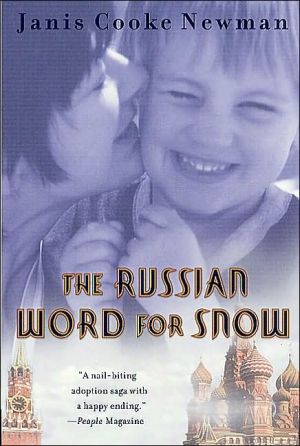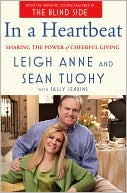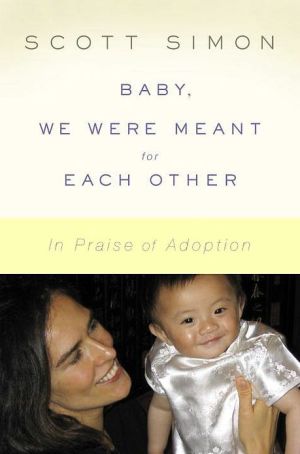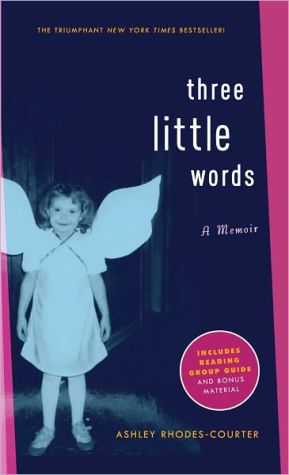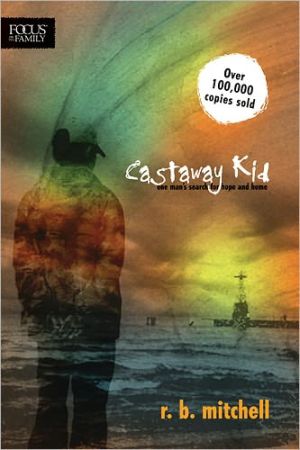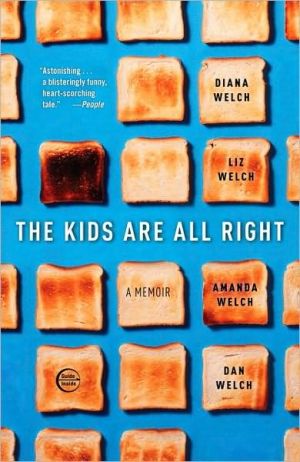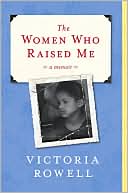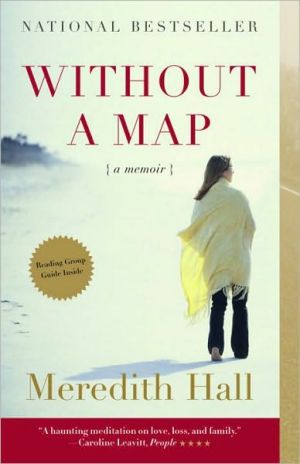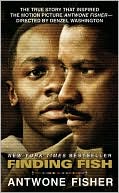Russian Word for Snow: A True Story of Adoption
Janis Cooke Newman first saw the baby who would become her son on a videotape. He was 10 months old and naked, lying on a metal changing table while a woman in a white lab coat and a babushka tried to make him smile for the camera.\ Four months later, the Newmans traveled to Moscow to get their son. Russia was facing its first democratic election, and the front-runner was an anti-American Communist who they feared would block adoptions.\ For nearly a month, the Newmans spent every day at the...
Search in google:
Honest, humorous and insightful—a story of adoption set against the turmoil of Russian politics. The Russian Word for Snow is Jams Cooke Newman's enchanting, funny and perceptive account of her emotional journey toward motherhood?from Newman's efforts to become pregnant, to her first visit with the child who would become her son, to the upheaval of Russia's first democratic election. Newman and her husband chose their son, originally named for the Russian word for snow because he was born in the winter, from a videotape of Russian orphans. Four months later, they were caught up in Moscow's social and political unrest, desperately trying to get that child out of the country. American families adopt more children from Russia than any other country. Unlike most books on the topic, Newman's work describes in unflinching detail what it feels like to adopt. This book is a must-read for anyone who has adopted or considered adoption, and for anyone who is looking for a heartfelt story set against an exciting international backdrop.About the Author:Janis Cooke Newman's writing on this subject has been published in numerous magazines, including Salon, and in several anthologies. She lives in Northern California with her husband and their son Alex.
\ Chapter One \ \ \ I never wanted to have children.\ I'd watch the families climbing out of their minivans and walk wide around them, so I wouldn't be contaminated by the damp stickiness of their parenthood. I'd study them from afar, little girls with princess hair and socks that matched their dresses; moms lumpy from pockets filled with goldfish crackers and Cheerios. The dads always seemed confused, lugging a crying child in a plastic carrier like something heavy someone else had slipped into their basket at the supermarket.\ The lives of these parents appeared to be made up of running noses, earnest cartoon characters, and small plastic cars to be stepped on with bare feet. Watching them move across the parking lot, the mother unaware of the small chocolate-colored handprint on the seat of her pants, the father dragging a flowered diaper bag behind him, I'd shudder and walk cleanly away, a neat leather purse over my shoulder.\ And then my mother started dying.\ My mother's cancer came as a small hard lump in her breast. She discovered it one morning in the shower and told her doctor before she told anyone else. She had to wait a week for the mammogram. Another to see the surgeon. She said she could feel the cancer cells spreading through her body as the receptionist turned the pages of her appointment book.\ When the surgeon did see her, he put her in the hospital and removed the hard lump the size of a BB that wasn't supposed to be there. Afterward, I flew from my home in California to New Jersey to see her.\ "It's inthe lymph nodes," she said. She was sitting up in bed, dressed in a hospital gown with green geometric shapes printed on it. She wasn't smoking, and it made her look strangely still. "All I get is bad news."\ They kept her in the hospital for five days. The night before she was released, she told me, "Tomorrow, we'll go to the outlets."\ "You're sure?"\ "Yes. I want to go to Lizzie's." Lizzie's was the Liz Claiborne outlet. My mother kept on a first-name basis with all of her favorite stores.\ By 10:00 the next morning, we were walking among clapboard buildings with false dormers meant to make the mall resemble a small New England village. By noon, we'd made two trips back to the car to unload shopping bags. By 3:00, the arm where the surgeon had removed my mother's lymph nodes was so sore, she could try on only slacks and shoes.\ The following week, I drove her to her first appointment with the radiologist. While we waited, I pointed out the purplish highlights in the receptionist's hair, the outfits of celebrities in People magazine, hoping these things would keep my mother from noticing the sallow-skinned people waiting beside us.\ After half an hour, the purple-haired receptionist called my mother's name, and a technician tattooed the place on her breast where they would aim the radiation.\ The next day, my mother told me to go home.\ "I'll be fine," she said. My parents were divorced, my mother now married to man who was younger than she was. "Mike will take care of me."\ After the radiation, my mother was given chemotherapy. Every three weeks she'd lie in a reclining chair while drugs that destroyed every fast-growing cell in her body dripped into her veins. Her last treatment came the week before Thanksgiving. My husband, Ken, and I flew back to spend the holiday with her.\ We sat in her living room surrounded by my mother's collection of antique clocks—clocks that chimed the hour several minutes apart, so that I always felt that time itself was forced to wait until the last clock had caught up. My mother's scalp was covered with soft down like a baby duck's, and she'd lost the thick black eyebrows that made her look like herself. Her skin had a greenish cast, made greener by the pale pink lipstick she liked to wear.\ "It was hell," she told us. "I don't care what happens, I'm never going through that again."\ But two years later, when the cancer metastasized to her liver, she agreed to try an experimental high-dose chemotherapy.\ When my mother's cancer returned, undeterred by the radiation and chemicals the rest of her body couldn't tolerate, I began to believe that I would be next. At least once a week, I'd check my own breasts, lying flat on the floor because I thought it would make it easier to detect the lump I knew was hiding under my skin like a small time bomb. Moving my fingers in the tight spiral shape I'd learned from the "Guide to Breast Self-Exam" enclosed in a package of panty hose, I'd hold my breath until I'd reached the last spiral.\ "I'm thinking about having a mastectomy," I told my mother on the phone.\ "Whatever for?" she asked.\ "I'm afraid this is going to happen to me."\ "I did not give you breast cancer," she said, and hung up.\ Not long after, I stood in line at the supermarket behind a woman with boxes of apple juice and a little boy in her cart. As the woman waited for the cashier to ring up shampoo that wouldn't cause tears and packages of fruit leather, she ran her fingers up and down the back of the boy's Winnie-the-Pooh sweatshirt. I watched her brush the fuzzed fabric and thought that her life must be filled with the touch of soft things: flannel pajamas and stuffed bears, well-washed blankets and the little boy's skin. Running my fingers along the sleeve of my sweater, I tried to imagine what that would be like.\ As my mother lost the ability to walk—from the cancer or the chemotherapy, nobody seemed to know which—I began to wonder what it would feel like to be pregnant. I imagined myself huge and round, so fertile I could make fruit and flowers spring out of the ground just by walking over it. Pregnancy seemed the antithesis of cancer; another condition that caused cells to multiply and divide, but with an entirely opposite result.\ When the experimental chemotherapy did not slow the cancer in my mother's liver, I called and told her I wanted to visit.\ "This isn't a good time," she said. "The house is a mess. I've got a woman here taking care of me. There's really no room for you."\ And I let her talk me out of coming, afraid that if I saw her I would have to tell her about wanting a baby.\ The one time I'd gotten pregnant, my mother had slapped my face. I was twenty-one years old and had forgotten to use my diaphragm.\ "We could get married," my boyfriend told me. He was thirty-three and had been married before.\ "I don't think so," I said, not realizing until he'd asked that I didn't want to marry him. "Besides, I don't want children."\ On a bright morning, he drove me to a clinic near the Bronx Zoo, where they performed so many abortions the preop counseling was done in groups of five.\ Two weeks later, I woke in the middle of the night with stomach cramps and threw up on the floor.\ It took nearly two months for the doctors to discover that I was still pregnant, the fetus trapped inside one of my fallopian tubes, rupturing it every time it tried to grow. They put me in the hospital two days before Christmas and scheduled me for surgery.\ The night before the operation, a fireman dressed as Santa Claus came into my room and gave me a candy cane and a handful of Hershey's kisses. Later, the doctor came by to explain that he would have to remove the damaged tube.\ "As long as you're in there," I told him, "tie the other one."\ The doctor stared at me, sucking on the chocolate kiss I'd given him.\ "I'm not planning on having children. Ever."\ "That's not a decision you should make right now."\ And when the surgery was over, I still had one untied tube.\ After the operation, I moved back into my old bedroom. I told my mother I'd had the surgery to remove a cyst.\ A few weeks later, a bill from the anesthesiologist arrived and she opened it. At the bottom of the page, under diagnosis, someone had typed "tubal pregnancy." My mother read the words and slapped my face. She said it was for not telling her the surgery had been so complicated, for not letting her know that I might have died. I told her people rarely died from having a fallopian tube removed, but she only looked as if she wanted to slap me again.\ "I'm so glad you don't want to have children," my mother would say after that. "It's too risky for you." And I didn't argue with her, though I knew that women who'd had tubal pregnancies also had babies every day.\ While my mother waited to hear if she'd be a candidate for a bone-marrow transplant, I sent her small gifts. Bath oil scented with lavender, a wooden roller etched with tight grooves to massage her feet, books on tape with stories where nobody died. One day, I sent her a tape about cancer patients who had cured themselves using meditation. It was called, "How to Be an Exceptional Patient."\ "Why did you send this to me?" my mother shouted into the phone. "I don't want to be an exceptional patient, I want to be left alone." And she hung up before I could say anything.\ The only time my mother had ever walked me to school was the first day of kindergarten. I remember shiny black plastic shoes reflecting red and yellow leaves, a pear in a brown paper bag with my name printed on it, the feel of her bigger hand wrapped around mine. When school was over, I ran outside, searching for her among the mothers standing outside the chainlink fence.\ "It's only two blocks," she said, when I got home, my plastic shoes already cracking across the toes. "You know the way."\ The summer I was ten, my father would take my brothers and me waterskiing on a small lake that smelled of oil and gas from the boat engines. We were each allowed to bring a friend, and every Saturday, six kids and my tall black-haired father would take turns skiing until our legs felt shaky and we'd swallowed so much lake water that it hurt to take a deep breath.\ My mother never came with us on those Saturdays. "A whole day on a boat with a bunch of kids?" she'd say, taking a pack of cigarettes and an instant iced tea out to a lounge chair in the backyard. "No, thanks." And she'd look at my father as though his wanting to spend the day with us revealed something embarrassing about him.\ I remember hearing my mother once say that she wished she'd never had children, but when I asked her about it, she sounded surprised.\ "That's impossible," she said, lighting a long, thin cigarette.\ "I couldn't wait for you to be born." And then she repeated the story she told me every year on my birthday.\ "When I went to the hospital to have you, it was still winter. The trees were bare and there was snow on the ground."\ "In April?" I asked, because that was what I always asked.\ "Yes. But the day I left the hospital to bring you home, the flowers were blooming and the birds were singing. It was like you'd brought spring with you."\ After a while, my mother stopped talking about the bone-marrow transplant. I knew she was on antidepressants, and there must have been something else for the pain. Sometimes she'd fall asleep while I was talking to her, and the woman who was staying at her house would have to hang up the phone.\ Again I made plans to visit.\ "Ken and I are going to Boston on business," I told her. "We'll come to see you as soon as we're finished."\ She drifted back into sleep before she could tell me not to come.\ While we were in Boston, my brother called to tell me that my mother had died. When I told Ken, he held me in his arms and cried into the back of my neck. I could see his shoulders moving up and down.\ There were no flights to New York until the next morning. In the meantime, I needed to be around noise and people, so Ken and I walked to Boston's North End, to the Italian neighborhood. It was the last night of a feast dedicated to a Catholic saint—I didn't know which one, and the hot, rainy streets were jammed with tourists and locals. Men in white V-necked T-shirts carried a plaster statue of the saint, dipping him so the faithful could pin dollar bills to his ribbon sash.\ There were sausages sizzling at stands on every corner, and somebody had set a pair of speakers in their second-floor window—Frank Sinatra singing "Fly Me to the Moon." I knew these things were there, the smell of meat cooking, the syrupy sound of Frank Sinatra's voice, but it was like observing them through water.\ I don't have a mother anymore, I repeated to myself, as Italian women with fleshy arms reached past me to embrace friends in the crowd. And I wondered when I would cry.\ Ken and I walked by booths featuring games of chance—roulette wheels where the money lost would benefit the church—past stands filled with pyramids of sugarcoated zeppoles shiny with oil.\ "We should eat," I told Ken. And we pushed into a tiny restaurant where a neon sign blinked: "We are famous for our mussels."\ We sat at a small table, our knees touching beneath the red and white checked cloth.\ "Mussels," we told the waitress, unable to disobey the sign.\ The mussels came served in a cast-iron skillet that burned my wrist when I touched it to the edge. We washed them down with wine that stained our teeth purple.\ I tried thinking about the time my mother had hit me with a can of frozen orange juice and broken a blood vessel beneath my eye. The six months we didn't speak to each other after she made me leave the house.\ Instead, I remembered the Easter I was thirteen and my best friend and I were to sing a duet in the church choir. We'd practiced for weeks, our voices high and pure—just like angels, I'd thought. But on Easter morning, as we stood surrounded by white lilies, the hymn about Jesus rolling away the stone suddenly seemed unbearably funny, and we started giggling.\ The organist began the music over again, giving us a chance to catch up, but we couldn't stop laughing long enough to get out any of the words about the washing away of our sins. My Sunday-school teacher hissed at us from behind the organ, and I was certain that my mother Would be furious. But when I spotted her in the second row, her face was buried in the Easter-morning program, and the top of her head was shaking with laughter.\ In the restaurant famous for its mussels, a man wearing a plastic lobster bib pretended to catch his little girl's finger with a red claw as his wife showed their son how to twirl spaghetti in a soup spoon.\ My mother is gone, I thought, watching the woman lick sauce off the little boy's nose.\ "I've been thinking about having a baby," I told Ken.\ He held a missel shell shoped like a small boat in the air.\ "You said you never wanted children."\ "But you always did."\ He took a drink of the wine. His tongue looked purple.\ "I could never imagine not having them."\ "Did you think I'd change my mind?"\ "I hoped you would."\ I watched the father in the plastic bib wiggle the front half of a lobster in his little girl's face.\ "It might not happen right away. I have only one fallopian tube, and I'm almost forty."\ "We could start tonight." Ken showed me his purple tongue.\ "Not tonight." I didn't want to start a baby in all that sadness.\ Instead, we ordered another bottle of purple wine, and as the pile of mussel shells grew between us, we talked about whether crooked teeth were hereditary, and spoke aloud every name we had ever loved.\ MY GREATEST DAY IN GOLF\ THE LEGENDS OF GOLF RECOUNT THEIR GREATEST MOMENTS\ \ \ By BOB McCULLOUGH\ \ THOMAS DUNNE BOOKS\ ST. MARTIN'S PRESS\ Copyright © 2001 Bob McCullough. All rights reserved.\
\ From the Publisher"A nail-biting adoption saga with a happy ending."-People Magazine\ "The Russian Word for Snow is about the alchemy of desire, courage, grace; about the buried secrets of a foreign land; about a little boy in a Russian crib who tangles his fingers in his new mother's hair. Their story is compelling. It is poetry. It is true. It held me transfixed as I read." -Beth Kephart, author of the 1998 National Book Award finalist A Slant of Sun\ "The couple's fight to bring Alex home after months of dashed hopes and bureaucratic snafus vividly illustrates the perils of foreign adoption."—People Magazine\ "Newman's story, told with understated grace, reminds us that parenthood is an internal journey not measurable by blood or footsteps; that life with a child is a daily opportunity for mutual redemption in moments both unique and fleeting." —Kate Moses, Salon.com columnist and co-editor of Mothers Who Think\ "On one level, this is one woman's story of going to Russia to adopt a little boy and experiencing the wrenching, exuberant passions of falling love with a child. On another level, it's every mother's story—our doubts and our fears about what kind of mother we will make. The writing is compelling, and straight from the heart." —Adair Lara, San Francisco Chronicle columnist and author of Hold Me Close, Let Me Go\ "Beautifully written, intimately portrayed, it's an extraordinary tale of the power of a mother's love." —Karin Evans, author of The Lost Daughters of China\ \ \
